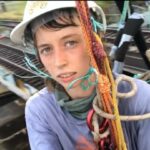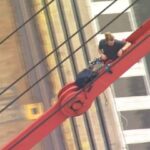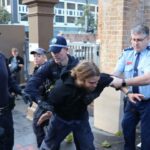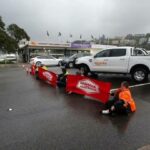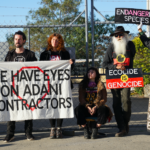“It’s a Whole Systems Change That We Need”, Asserts Blockade Australia’s Zelda Grimshaw
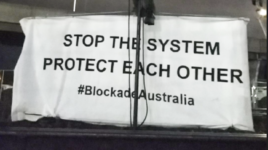
Blockade Australia (BA), one of the most successful and assertive climate defence groups to have emerged over recent years, descended upon key public infrastructure again last week, as it successfully disrupted “business as usual” at three ports in three states for five days running.
The NSW police and those in Victoria and Brisbane seemed surprised to have the ardent nonviolent climate defenders positioning themselves at points at Newcastle Coal Port, Brisbane Port and Port Melbourne to ensure that fossil fuel shipments were slowed down and delayed.
So, starting on Monday 19 June, Blockade Australia climate defenders began staging nonviolent direct actions at some of the largest fossil fuel ports in the country. And this went on at every one of those three sites for five days: Monday through to Friday.
And one very clear message that Blockade Australia has communicated to the entire Australian community is that, despite the draconian penalties state governments have put in place to prevent people spreading the word that the planet is going up in flames, the demonstrations will continue.
Legislators lose the plot
Blockade Australia and Fireproof Australia each carried out a series of protests in March 2022, and while their tactics differed, they’re message was the same: that the government is so intertwined with the fossil fuel companies that they’re willing to let the planet collapse for short-term profit.
That’s when the Perrottet government decided to hit back passing laws in early April last year that in the end have left the community unable to hold unauthorised protests that obstruct a bridge, tunnel, road or major facility, via a threat of up to 2 years imprisonment and/or a $22,000 fine.
Blockade was determined to keep going though, and they publicly announced that they’d be holding a week of disruptive actions in Sydney this time last year. And then the NSW Police Force, with its new Strikeforce Guard, went berserk trying to stop people from staging peaceful protests.
Prior to the planned week of protests, BA supporters were camping on private property in Colo, when some of the activists came across two men monitoring them in the bushes dressed in camouflage gear. And these stalkers turned out to be police officers, who then later came back and raided the property.
The defenders are back in town
Since the crackdown on Blockade over June/July last year, it really did seem like the bipartisan major party plot to keep fossil fuels burning for as long as possible, and in doing so, keeping the industry lobbyists pleased and ensuring votes come their way, had won out.
But what Blockade Australia did last week has proven that all is not lost. The draconian laws have been rejected by parts of the judiciary and most of the community, and unauthorised nonviolent direct actions are now back on the agenda. So, Minns and Co better get used to it.
Sydney Criminal Lawyers spoke to Blockade Australia spokesperson Zelda Grimshaw about the impact last week’s actions in multiple cities had, the fact that Chris Minns doesn’t seem to understand social media technology, and how BA is aiming to throw a huge spanner in the works.
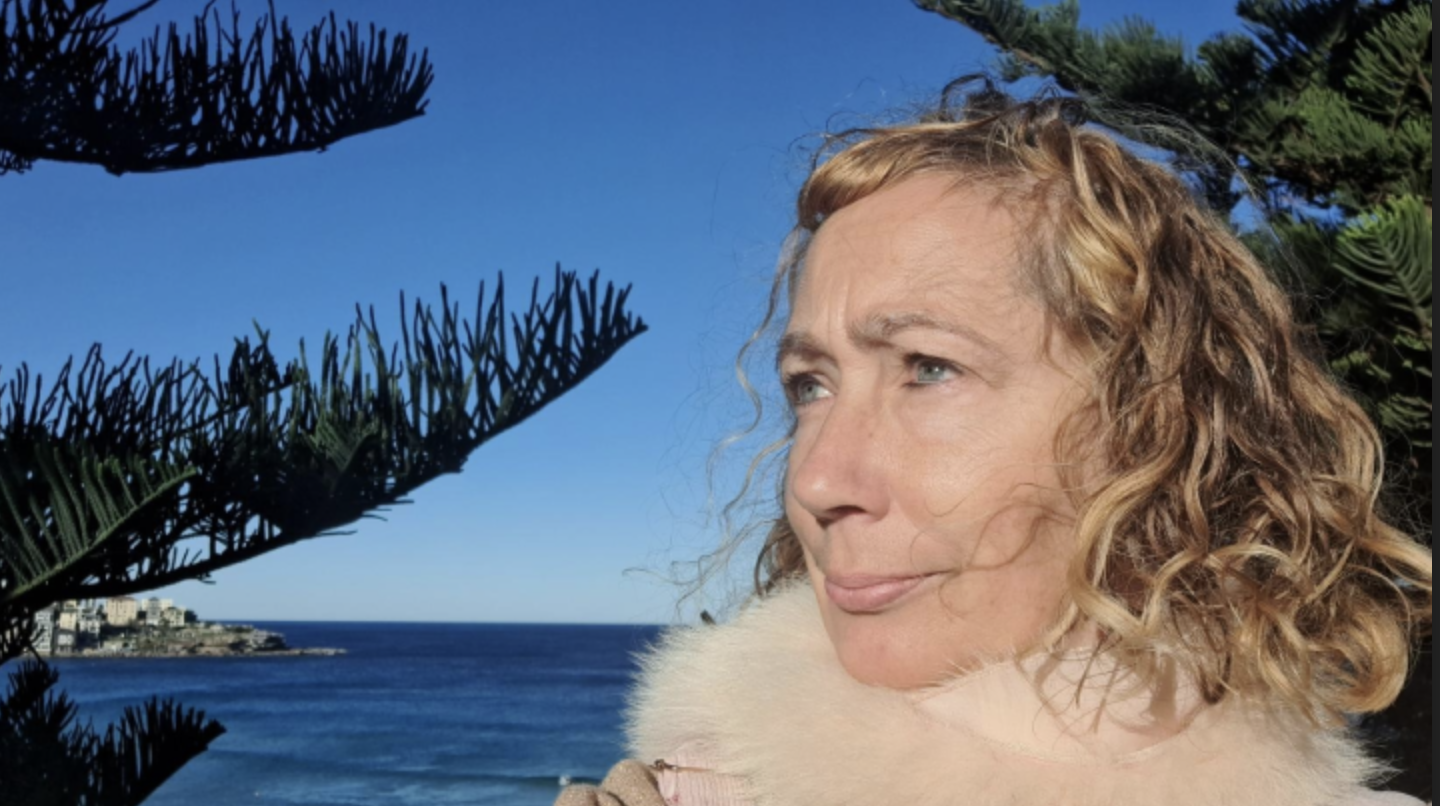
Blockade Australia came out of nowhere last week to hit three major fossil fuel ports in three different cities.
Zelda, how would you describe what happened over those five days? And what sort of impact has it had in terms of the climate defence movement and public awareness?
It’s a profound impact to block Australia’s export economy. And it’s more than one fossil fuel at a time. Blockade Australia are trying to shut down the whole system of Australia’s economic functioning and the systemic violence that it relies on.
So, a year ago, the NSW police Strikeforce Guard tried a strategic incapacitation operation, targeting Blockade Australia, and arresting 43 people, who were slapped some ridiculous charges and even more ridiculous bail conditions.
That was really an attempt to stop the Blockade Australia network from organising. And that attempt has failed, as we’ve come back threefold like the hydra and shown that you can’t decapitate the climate movement.
Do you have any awareness from last week about whether the authorities were shocked that Blockade Australia were back?
We are not in direct lines of communication with the police or the justice minister, so I can’t speak to their emotional reaction, but I imagine they were surprised.
Chris Minns certainly seemed a bit shocked and tried to push through some idea that he was going to censor protests on Facebook.
We’re bemused by that, partly because I can’t see how he thinks he can do this. I don’t think he understands how those platforms operate. I can’t see how a ban on livestream for some protests would work for a streaming platform.
But also, even if we were completely unable to broadcast our actions on the internet, that would not deter us, we are not there for likes on Facebook.
We are there for the planet, so we are there to disrupt the Port of Newcastle, the Port of Melbourne and the Port of Brisbane.
That’s the point. Even if we had no publicity about it – no media coverage or no social media coverage at all – that would not be a deterrent, in any sense for us.
During the live social media video posts and in the press releases, Blockade has made clear that the significance of these actions taking place at this time is that it’s been about 12 months since the NSW Police Force excessively cracked down on the BA network and its supporters.
How would you describe what happened a year ago in regard to BA and the NSW police? And how was it for the group to recover after that onslaught?
The repression unleashed against Blockade Australia in June 2022, with the Colo raids and the aftermath of those raids, which saw 43 entirely peaceful human beings, many of whom had not committed any offences, charged with things like conspiracy and affray and blocking the Harbour Bridge.
It was an insane police overreach. And it has backfired. It certainly gave a lot of publicity to Blockade Australia. International news was riveted by the spectre of helicopters descending upon a group of people camping peacefully in the bush together on a private property.
It was very extreme repression and the flow on effect for us has been absolutely exponential growth in the movement.
So, we’ve seen lots of new people come in, and the people who were already part of the network deepened their commitment, because we can’t let that kind of structural violence stop us from taking the action that’s needed to avoid climate collapse.
So, the overbearing reaction to the protests actually served to strengthen the movement?
I would say so, yes.
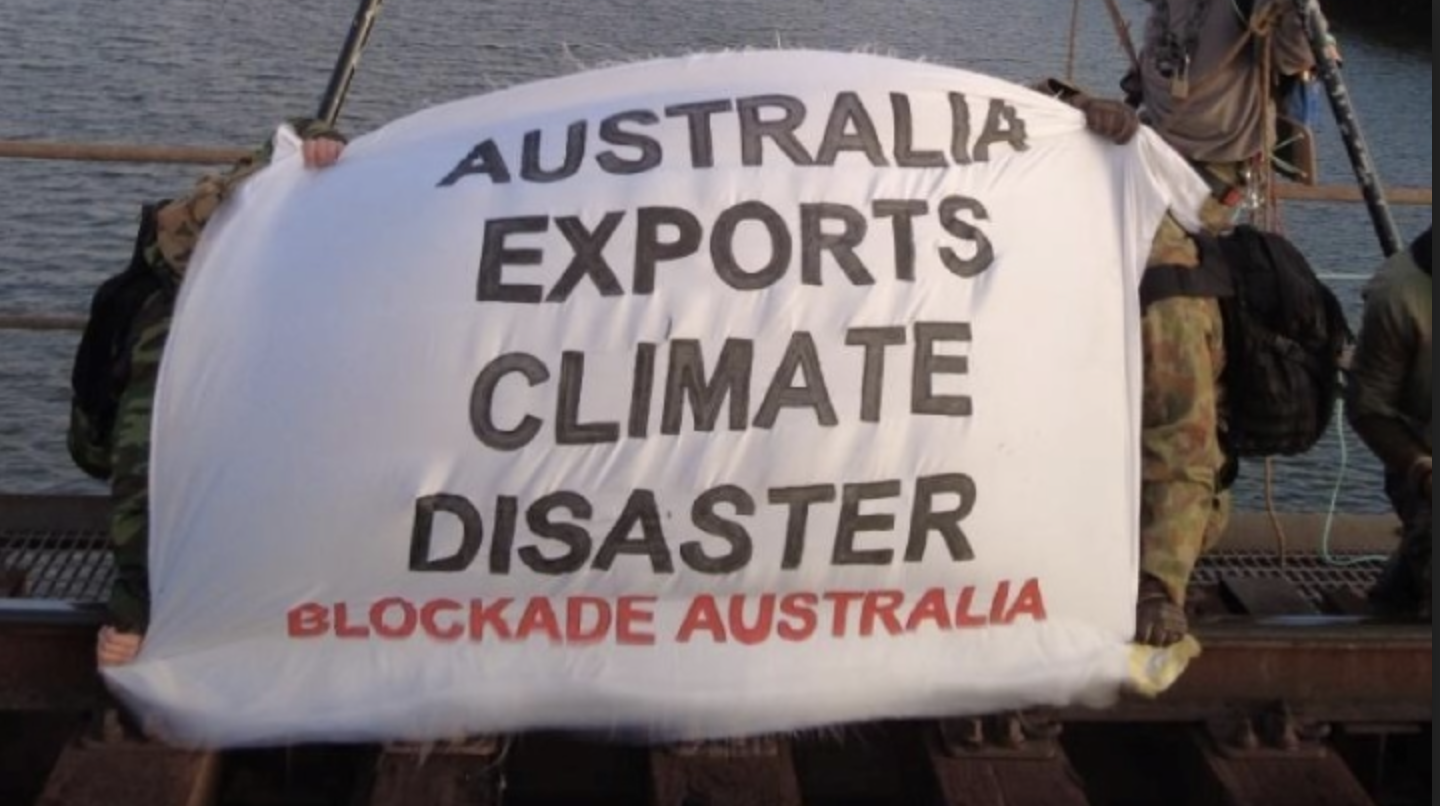
In terms of the recent actions, how have the police been reacting? What’s happened to activists? And has there been any change from the aggression officers displayed towards climate defenders in Sydney 12 months ago?
This mobilisation has not seen the sort of deliberate structural violence that Strikeforce Guard implemented last year.
We have seen all of the people who put themselves in harm’s way, who put themselves up on tripods and monopoles to stop the destructive operations of Australia’s economy, those people have been arrested and charged.
The only violence from police that I am aware of is that they tried to forcibly remove one of our people from a lock-on device in Brisbane and tore her finger.
So, that person required surgery. And there won’t be any serious damage done, but that person has required surgery.
The Brisbane police this time have been, as far as our experience goes, the most heavy-handed.
The extreme NSW protest regime sparked by the actions of BA and Fireproof in Sydney in March 2022 have now been in place for over a year and these laws have also been put to the test in the NSW courts.
Tasmania and Victoria soon followed suit on passing their own excessive laws against protest that have more of a focus on logging. However, just last month, the Malinauskas government in SA implemented its own version of the Sydney regime.
How does the climate defence movement consider what’s happening here? What impacts have the NSW laws resulted in? And what do your recent actions say about the effectiveness of these laws in general?
People who are aware of the climate science, people who are reading the climate science and are listening to those words, and who are reading the IPCC reports are increasingly desperate about reversing the collapse that we are heading for, so I don’t think any amount of punitive measures is going to dampen that sense of urgency that people have.
How we are seeing governments react, not only here in Australia, but in the UK and certainly across the English-speaking world, there has been an uptick in the repression of climate activists. Instead of doing the thing that we need to do, which is transitioning to an economy that is compatible with life.
I don’t think that any of those repressive measures will stop climate activists because our moral conviction is we need to take the kinds of actions to protect life, but it is a much bigger picture for us.
It is not about personal consequences. It is about planetary consequences, so that’s why we are seeing people continuing to take these kinds of actions, despite facing gaol sentences and despite potentially being locked up and having to fight the huge fines and so on.
Such is the sense of urgency that we feel a duty to protect, indeed, life.
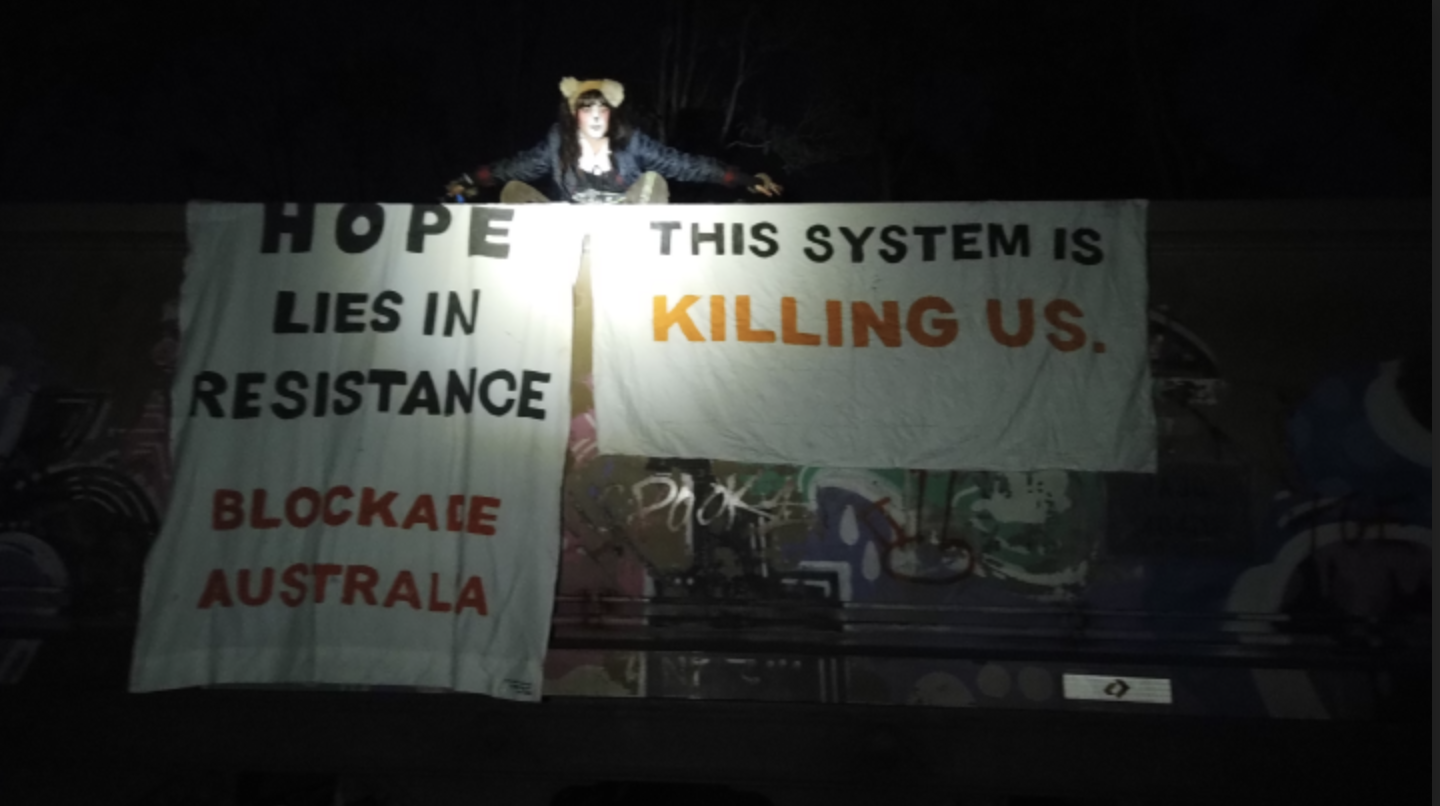
You’ve already touched upon this, but I’ll bring it up again. One unexpected outcome of last week’s actions is NSW premier Chris Minns says he’s going to consult with social media companies, like Facebook, in an effort to see them stop permitting users to livestream their nonviolent but disruptive climate actions.
What Blockade and other groups like yours are doing could hardly be termed as terrorist in nature. Indeed, your actions are actually an attempt to preserve life.
So, how do you consider this move by the premier in petitioning social media to censor nonviolent actions?
Premier Chris Minns is just showing how out of touch he is. He doesn’t understand how Facebook and other social media platforms work. And he referred to Blockade Australia and our business model, which he said relies upon Facebook.
Well, we don’t have a business model. We are not a business. We are a network of human beings, who don’t want to see our planet destroyed. That’s who we are.
There is no business model. And we really don’t care if we are on Facebook or not. We are not there for the likes. We are there for the planet.
And lastly, Zelda, it seems a little redundant to ask this question, but Blockade Australia supporters and other climate defenders are putting their liberty on the line in order to spread this message, so why are you out there doing what you’re doing? How serious is the climate crisis at present?
Climate scientists have been shouting and crying for years now: that we need to stop polluting. We need to urgently stop digging up fossil fuels. We need to stop clear-felling forests. We need to stop polluting.
Our whole economic system is predicated upon polluting, exploiting, extracting. So, it’s whole systems change that we need.
How Blockade Australia is seeing it. A lot of the climate movement have gone after one destructive project at a time, like trying to save a particular forest from logging or trying to stop a particular mine from going ahead, and that’s really valid and important work.
What we’re trying to do is put a spanner in the whole works, the whole system.
So, we’ve taken that slogan “system change/not climate change” and we’ve looked at how we can apply that slogan, because without a transformation in the way we do business and the way we run our economy on this planet, we are heading over the cliff of irreversible climate collapse.


